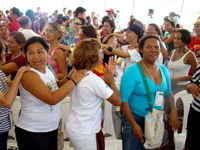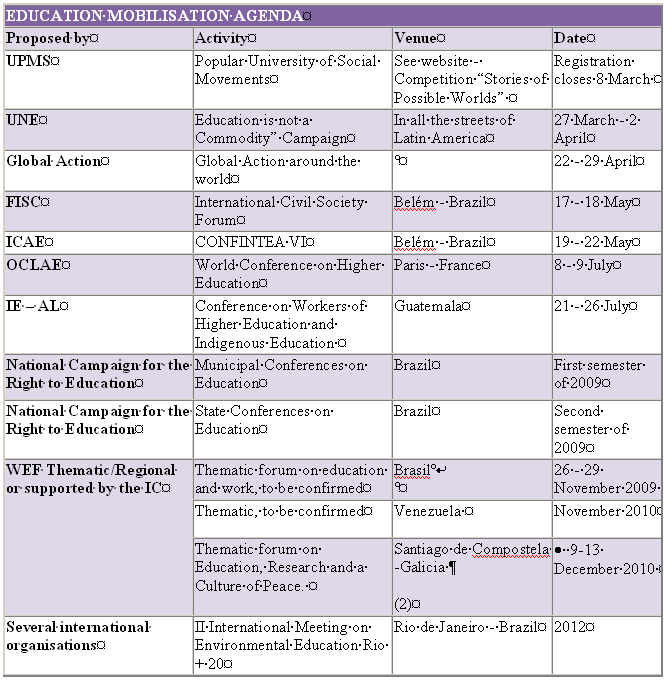WSF 2009: an account of select events form the World Education Forum
By Alessio Surian
Between January 26 and 27 of 2009, the Convention Centre of Hagar provided the setting to bring out a new publication of the FME, with the participation of approximately ten thousand people During the proceedings, six plenary sessions were held to account for the content of regional, national, thematic and world forums from the first edition in Porto Alegre, which took place in 2001. It was my turn to participate in and coordinate the session on education and economic solidarity (see Annex).
The IAI assisted Dignity International in organizing a conference which took place at the UFRA on the second day of the WSF. Attending the conference were speakers from the IAI (Pedro Franco), the Assembly of the Poor (Thailand), Ekta Parishad (India), the European Anti Poverty Network, the Nairobi People's Settlement Network (Kenya), the National Conference of Dalit Organisations (NACDOR, India), Union of Two Movimentos of Moradia (Brasil), Youth for Unity and Voluntary Actions (YUVA, India).
The conference had as its framework the search for concrete forms of resistance and a fight to confront the urban-rural crisis and poverty as a violation of human rights. Dignity International and the IAI called upon their members to encourage dialogue and exchange between the rural and urban social movements to create social, political and economic change.
The Popular University of Social Movements (PUMS) invited me to coordinate a meeting on the presentation of the project "Stories of a Possible World” on the last day of the forum in the UFPA During the meeting, Boaventura de Sousa Santos (CES Coimbra) explained her motivation for developing the work of cultural 'translation' between social movements (see article) and Oscar Jaradió explained how the work of systematization needs to be relevant and reinvented each and every time for social movements. Within this framework, the UPMS invited people to tell their stories by taking part in the project "Stories of Possible Worlds" (open to all those who work for social change), offering an opportunity to identify and appreciate new social practises.
T he aim of the project is to create a digital archive of stories of alternative practices in various spheres in accordance with the principles of the World Social Forum to which the Award refers. These are spheres in which people struggle for human rights and democracy : work, economic solidarity, cultural, religious and political dialogue, the environment, health, peace, the well-being of the people, social participation etc.
Participants can bring stories that are completed or still in progress; are successful or did not have the expected result either they didn’t happen or because they were simply an idea and occurred in part.
The "Stories of Possible Worlds" Award is therefore a pretext to stimulate the sharing of, and reflection on experiences, and to share knowledge.
Experiences of struggles and social change which are taking place currently among movements and social groups as well as past experiences which have impacts currently can be included.
What types of works are suitable for this award?
Works can be both those experienced directly by the protagonists themselves of the struggles or by third parties and the stories can be told others and the stories can be narrated individually, by work groups, or presented as collective stories.
Stories or Investigations
Works belonging in the "Stories" category can be expressed in one of the languages set out below, or a combination of them, with the objective of achieving the most effective communication:
- Autobiographical or biographical writings/texts
- Picture stories
- Video stories
- Audio stories
- Other languages
The "Studies and Research" section includes, among others, works dealing with the analysis of social struggles and events of the past, research that links the past with the present from an historical, sociological, anthropological viewpoint—or better yet— an interdisciplinary approach. Also included are works connecting two or more experiences from a comparative perspective.
The participants may use several methods of communication simultaneously (for example: texts, photos, video, audio) to give strength and expression to the stories being told.
On the last day of the WSF, the Education Assembly collected the WEF proposals and those of the international, national and local social networks, organisations and movements that took part in the WSF. Among them were the Global Campaign for Education, the World Education Forum, the University of Popular Movements, the CEAAL (Adult Education Council of Latin America), the OCLAE (Continental Organization of Latin American and Caribbean Students), the Latin American Campaign for the Right to Education, Education International of Latin America, the ICAE (International Council for Adult Education), the REPEM (Popular Education Network among Women) and the FISC (International Civil Society Forum). Within the framework of the WSF, nearly 300 activities were held discussing education from different perspectives and among different groups. Other activities from different fields of action and reflective thinking worked on the education perspective as key for needed and long-awaited social change, many of them interlinked with the education field.
The Assembly calls upon the construction of the World Education Platform; in particular:
- To fight for the universal right to public education together for all the inhabitants of this planet, which implies that learning is a social and human right; inseparable from other rights and is an obligation of the State to guarantee this right. This right for education is linked with the struggle of all movements and organisations involved in the WEF and WSF building process;
- To disseminate an free concept of education that respects, and coexists with, differences and similarities; be it popular and democratic, focussed on life values or associated with a worldwide culture of justice, peace and sustainability.
- To guarantee access to education and the use of wealth produced socially, prioritizing for the world's oppressed, silenced, exploited and marginalized;
- To promote social control of education-financing and the "non-marketing" of education;
- To demand governments and international organisations that they fulfill their commitment to education as a priority which they have not put into practice.
- To guarantee education and lifelong learning for both youths and adults.
Annex: Systemization report (World Education Forum, Belém 2009) - in Portuguese




